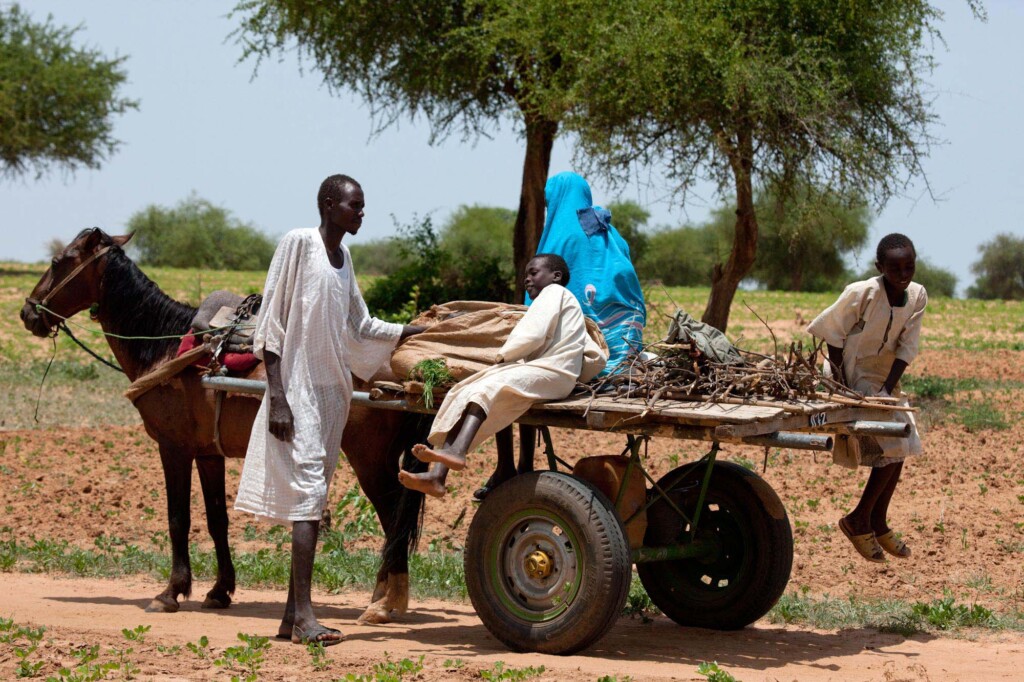Soaring prices make life ‘unbearable’ in Darfur, sheikh warns of ‘famine’

A farmer family in Darfur (File photo: Albert González Farran / UNAMID)
The prices of essential goods have risen in an unprecedented way in Darfur in the past few weeks, amid a shortage of cash among the people and the scarcity of fuel, food, medicines. Aid convoys have been delayed. Blind Muslim sheikh and social activist Younis Matar has warned of an “imminent famine” and accused the warring Sudanese army and the Rapid Support Forces (RSF) of fighting for “seats of power at a time when people are starving to death”.
Ahmed Hussein, spokesperson for the Joint Rebel Force in Darfur, told Dabanga Sudan that the current delay in safeguarding the delivery of humanitarian aid to the region is caused by certain bureaucratic arrangements related to the joint force itself.
Hussein acknowledged that the delay of humanitarian aid convoys to the war-torn western region contributes to the deterioration of the economic situation of the Darfuri. He vowed that the work would soon resume. “I expect the convoy of lorries to leave El Fasher [North Darfur] for Kosti [White Nile state] soon, to bring in fuel and medicines.”
180 thousand pounds for the onion mobile in Nyala and the city without water and electricity
The destruction of the economic structure in Nyala, capital of South Darfur, and the second largest city before the war between the Sudanese army and the RSF broke out in April, and the loss of water and power provision have led to exorbitantly high prices.
A merchant in Nyala yesterday complained to Dabanga Sudan about the prices at the wholesale market yesterday. “A 100kg sack of onions now costs SDG180,000* while a 50kg sack of sugar is sold for SDG115,000,” he said.
“And almost no one can pay these prices anymore, as the people have not received their salaries or wages for seven months.”
Gunmen
The situation north of Nyala is even worse. Security in Mershing has deteriorated to the extent that no traffic is possible anymore in the locality, except in a convoy arranged by gunmen, allegedly affiliated with the RSF.
A resident of Mershing town explained to Dabanga Sudan that the owners of vehicles and motorised carts pay “convoy fees” ranging between SDG150,000-SDG200,000. Individuals pay SDG2,000 to SDG3,000 per trip.
“We thank God that we are still alive. There is no one here to protect or support us,” he said, and pointed to the “complete failure” of the agricultural season due to the lack of security and the release of livestock by shepherds at the farms.
No import from the south
High prices also hit the markets of Ed Daein, capital of East Darfur. The rises here have not only been caused by the RSF-SAF battles in the city, but also by the violence in Abyei, an area in southern West Kordofan at the Sudan-South Sudan border, which is claimed by both countries.
Since the war between the Sudan Armed Forces (SAF) and the RSF erupted on April 15, the states of Darfur have relied on the import of fuel and other commodities from Libya, Chad, and South Sudan.
An outbreak of fighting between two armed groups from South Sudan in Abyei however, has led to the suspension of the movement of goods from the south to Darfur.
Kheirallah Hamed, a resident of Ed Daein, told Dabanga Sudan that “the two South Sudanese factions have been warring for days now”. He said he expects the prices to stabilise “once the problems at the border stop”.
Another source, Hussein El Sayed, attributed the high prices in East Darfur to the insecure situation following the violent SAF-RSF confrontations before the latter took control of the state. “Armed robberies and the many RSF roadblocks in the vicinity cause traders not to risk their capital.”
‘Catastrophic’
Central Darfur Muslim cleric and social activist Matar Younis has launched “an urgent humanitarian appeal” to the international community to send aid to the displaced in Darfur “to avoid an imminent famine”.
Blind Sheikh Matar Younis, head of a Quran school in Zalingei, and general observer for the Darfur Displaced and Refugees Coordination, also appealed to the Sudanese army and the RSF to stop fighting and provide safe corridors for the delivery of humanitarian aid to those in need.
Younis also strongly denounced the warring parties’ “preoccupation with the struggle for seats of power at a time when people are starving to death”.
In an audio recording, broadcast on social network sites, he called the situation in the western part of the country “critical”, especially in the camps for the displaced in Darfur.
The sheikh said that he returned from a wide tour of visits to various camps and called the deterioration of the humanitarian conditions in the camps “deplorable”. He described the situation in the large Kalma camp near Nyala in particular as “catastrophic” and called for urgent intervention by relief organisations.
He attributed the humanitarian crisis also to the inability of local farmers to cultivate their farms during the rainy season between June and September. “Those who were able to tend their farm, were unable to harvest because of the violence.
He further called to the international community to intervene and stop the war “as soon as possible”.











 and then
and then